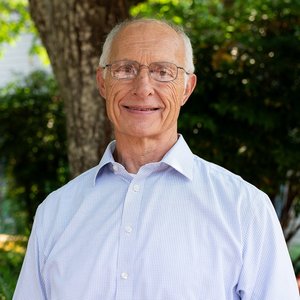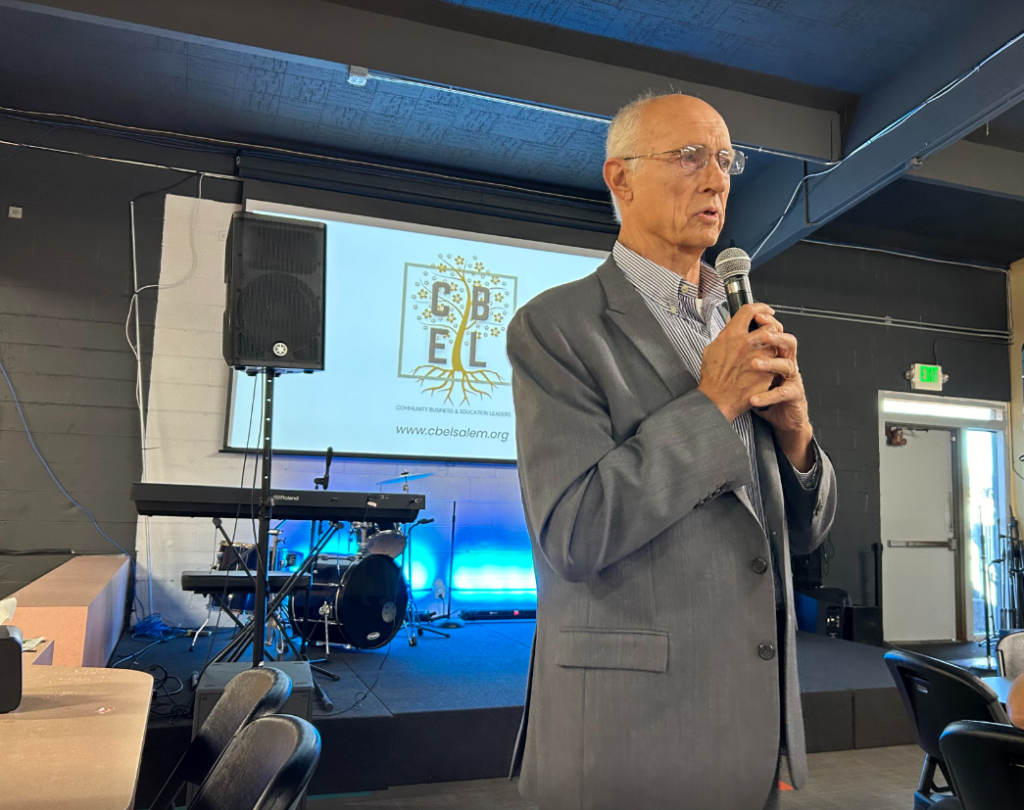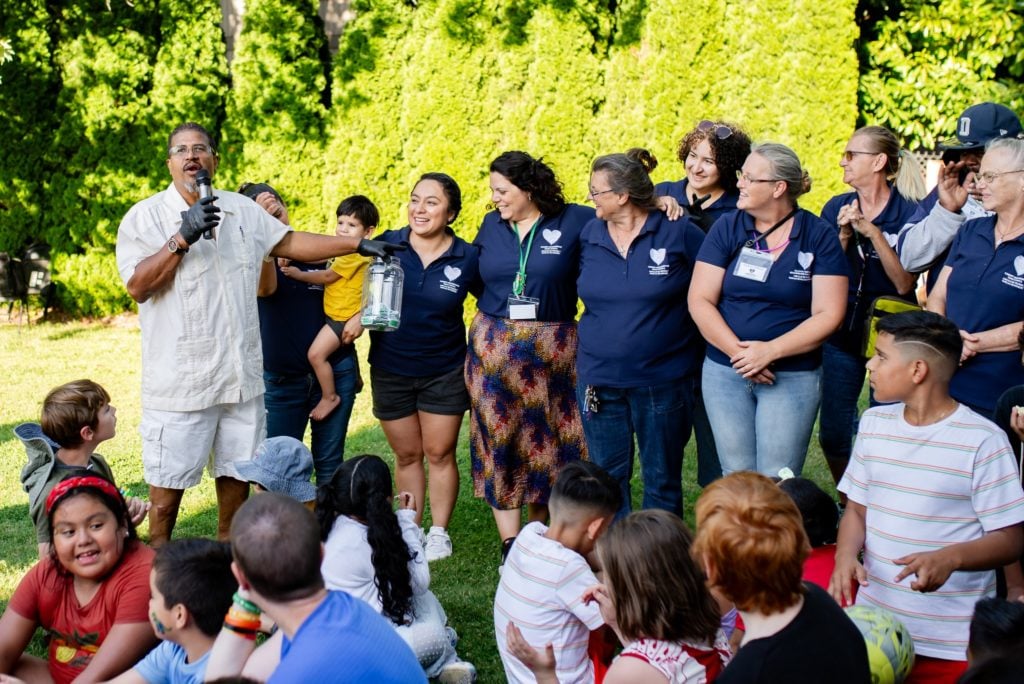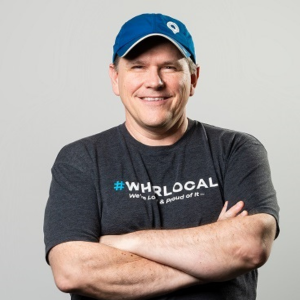On a bright morning in September, members of the Salem Area Chamber of Commerce gathered at The Rec in Keizer for their regular Greeters networking event. This time, the focus was on community strength and resilience, led by Jim Seymour, Director of the Community Business and Education Leaders Collaborative (CBEL). The presentation, filled with insightful stories, a powerful video, and heartfelt messages, highlighted CBEL’s mission to support families in the Salem-Keizer area through grassroots involvement, collaboration, and civic engagement.
Jim Seymour began the presentation by explaining the heart of CBEL’s work: bringing together leaders from business, education, and the community to find solutions for the challenges families face. But as Seymour pointed out, CBEL isn’t just about top-down leadership—it’s about listening to the people who are directly affected.


“We see families as the solution, not as the problem,” Seymour said. “Our commitment is to find the answers with the families, the individuals, and the communities that are struggling in our community.”
CBEL’s ultimate goal is simple yet powerful: to ensure every child in Salem and Keizer grows up in a safe, stable, and nurturing home, enjoys good health, succeeds in school, and has the opportunity to become financially self-sufficient.
CBEL’s mission goes beyond just good intentions. The organization has joined forces with George Washington University’s National Building Community Resilience Project, a nationwide initiative designed to strengthen communities facing adversity. According to Seymour, George Washington University’s research revealed three core ingredients for building resilience:
- Civic Engagement: Actively involving the people with lived experiences in the community to drive change.
- Integrated Systems: Connecting essential services—like education, housing, and law enforcement—so that they work together rather than in silos.
- Equity: Ensuring that every family willing to do what they can to support their children gets the help they need.
“Our role is to build community resilience that strengthens families and supports world-class education in Salem and Keizer,” Seymour explained. “That’s what we’re committed to.”
One of the standout moments of the presentation was a featured video, where CBEL’s real-world impact was showcased through the voices of local community members. The video highlighted the role of Neighborhood Family Councils—grassroots groups formed in neighborhoods where families face significant adversity. These councils give residents the power to bring about positive change and make their neighborhoods safer and more connected.
In the video, Eduardo Angulo, Director of the Neighborhood Family Council for CBEL, shared a success story from Northgate Park, a public space once plagued by safety concerns.
“Number one for parents—number one for moms—is safety,” Angulo said. Families had stopped going to the park because they didn’t feel safe. But thanks to the efforts of the Harmon-Northgate Neighborhood Family Council, which organized a series of “Fun Fridays” events in the park, families began to reclaim the space. Local agencies and nonprofits were invited to bring resources directly to the families, creating a safer, more welcoming environment.
“When you let people know there is something here for you, there is something here for your kids, it feels that sense of ownership,” Eduardo explained in the video. The efforts of these councils have made a tangible difference, giving families not only a sense of safety but also pride in their community.
The video also highlighted how neighbors, especially local moms, came together to address specific needs in their community. One of the major projects was getting public restrooms installed at Northgate Park—something the neighborhood desperately needed. This grassroots effort led to a partnership with the city, with councilmember Jose Gonzalez advocating for the project.
Jose shared his involvement in the video, explaining that when Eduardo invited him to a Fun Friday event, it opened his eyes to the needs of the neighborhood. After meeting with families, he became their champion, pushing for the inclusion of the restrooms in a $300 million bond project for city improvements.
“It wasn’t my idea. It was the moms based on the reality of one mom,” Eduardo emphasized, highlighting how the power of community voice can lead to real solutions.

As Jim Seymour wrapped up the presentation, he reflected on the broader research that supports CBEL’s community-driven approach. Drawing from insights by Harvard economist Edward Glaeser in his book Triumph of the City, Seymour explained that when poorer communities become healthier and wealthier, everyone benefits. Seymour outlined three critical ingredients that both the research and local families have identified as essential for building resilient communities.
“First of all, people have to feel safe,” Seymour emphasized. While police play a crucial role, true safety happens when people reclaim their neighborhoods and begin to trust one another. Seymour pointed to examples like Northgate Park, where the efforts of local families and grassroots leaders have transformed a once-unsafe area into a thriving community space.
The second key ingredient is housing. Seymour highlighted the critical need for stable housing, noting that 20% of children entering foster care do so because their families are poor and facing eviction. “Every child can’t grow up in a safe, stable, nurturing home when the parents don’t have a home.,” he said. CBEL is working to ensure that all families have access to affordable housing, which is essential for a child’s well-being.
Finally, Seymour stressed the importance of strong relationships between families and schools. He noted that in some of the neighborhoods CBEL works with, less than half of the children attend school regularly, making it difficult for schools to support them. However, as trust between families and schools improves, so does attendance. “Once there’s safety and once there’s housing, if children succeed in school, that’s going to be the path out of poverty,” Seymour said, underscoring the long-term impact of CBEL’s mission.
By focusing on safety, housing, and education, CBEL is helping families in Salem and Keizer build a stronger, more resilient future.
About CBEL

The Community Business and Education Leaders (CBEL) Collaborative in Salem, Oregon, brings together local leaders to build community resilience. By engaging with families, businesses, and schools, CBEL supports initiatives that promote safety, housing stability, and education in the Salem-Keizer area. Their work is guided by three core principles: authentic community engagement, interconnected systems, and equity. CBEL helps develop Neighborhood Family Councils and supports collective impact initiatives to address complex social challenges and improve outcomes for children and families.
For more details, visit CBEL’s About page.

